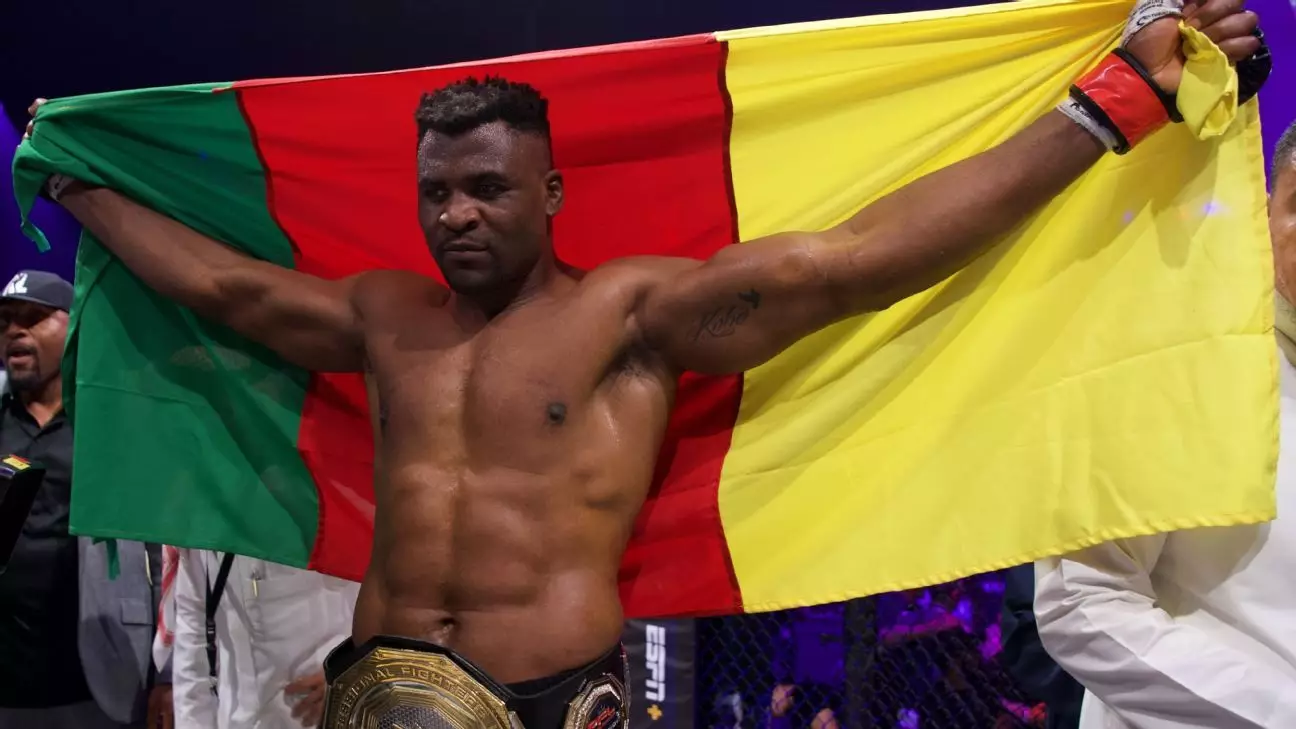Francis Ngannou, a name that resonates in the mixed martial arts (MMA) world, has endured a tumultuous journey, battling not only opponents in the ring but also personal tragedies and institutional disputes. The 38-year-old Cameroonian fighter recently claimed victory over PFL heavyweight champion Renan Ferreira in Abu Dhabi, marking a triumphant return to MMA after a two-year hiatus that saw him venture into boxing and cope with the devastating loss of his 15-month-old son. Ngannou’s story is not just one of athletic prowess; it is also a narrative of resilience, grief, and the quest for self-determination amid criticism from industry giants.
While the MMA community celebrated Ngannou’s comeback as a champion-worthy event, UFC CEO Dana White’s comments reflected a differing narrative. In a press conference prior to UFC 308, White insinuated that he had considered cutting Ngannou from the UFC before he secured the heavyweight title. Moreover, White accused Ngannou of dodging a match against current champion Jon Jones. This public clash between Ngannou and White epitomizes the growing rift between fighters seeking control over their careers and promoters seeking to maintain supremacy in a lucrative sport.
Ngannou, in a candid response during an interview with Sirius XM Fight Nation’s MMA Today, expressed his frustration with White. He suggested that White’s fixation on him signifies an inability to accept the evolving landscape of UFC’s heavyweight division and potentially his own diminishing influence within it. “Regardless of everything that happened, I’m not about him,” he asserted, emphasizing his own accomplishments. This sentiment underscores a broader trend where fighters are increasingly vocal about their grievances, challenging the traditional hierarchies of power within the sport.
A critical point of contention between Ngannou and White revolved around financial aspects—Ngannou’s assertation that he has earned more in his recent endeavors than he would have in the UFC. After leaving the UFC in January 2023 and signing with the PFL, Ngannou leveraged the freedom granted to him by aligning with the PFL to engage in significant boxing matches against well-established champions like Tyson Fury and Anthony Joshua. Although Ngannou faced defeat in both bouts, these high-profile fights reportedly netted him $20 million, thereby amplifying his marketability and financial position.
White’s claim that Ngannou would have been better off financially had he remained with UFC seems myopic in the face of these successes. Ngannou, confronting White’s assertions, pointedly asked about the unpaid wages he claims are still owed to him, referencing promises made regarding “backpay” from previous fights. It illustrates the complexity and frequent drama of UFC’s contractual agreements, where fighters frequently find themselves entangled in litigation and unresolved financial matters.
One of the most tantalizing prospects for Ngannou’s future could be a matchup against Jon Jones, a dream fight that remains demanding but ever elusive. Ngannou’s aspirations for a bout with Jones signify not only a competition of physical prowess but also a battle for respect within the sport. As Ngannou prepares for future fights, he remains optimistic about a potential cross-promotional agreement for such a match—if only Dana White could set aside his grievances.
“The only guy standing in the way of that fight is Dana White,” Ngannou remarked, emphasizing the roadblocks he faces due to organizational politics. As Jones prepares for a fight against Stipe Miocic, the stakes have never been higher, and should Jones emerge victorious, the anticipation for a potential clash with Ngannou would reach an unprecedented peak. The implication here is not merely about two fighters engaging in a bout, but rather about what such a fight signifies in terms of opportunities for fighters to get the biggest paychecks and the respect that comes with them.
Francis Ngannou’s journey from the depths of grief to the heights of victory encapsulates the evolving nature of MMA, showcasing how it intertwines with personal lives and professional ambitions. His willingness to confront Dana White publicly illustrates a broader narrative of fighter autonomy, raising questions about the future of MMA negotiations and fighter rights. Ngannou’s determination to reclaim control over his career is emblematic of a broader shift within the sport, where fighters are increasingly empowered to assert their value in a market hungry for competition, entertainment, and authenticity. As Ngannou looks towards future battles, both inside and outside the ring, his narrative demonstrates an indomitable spirit that resonates far beyond the octagon.


Leave a Reply